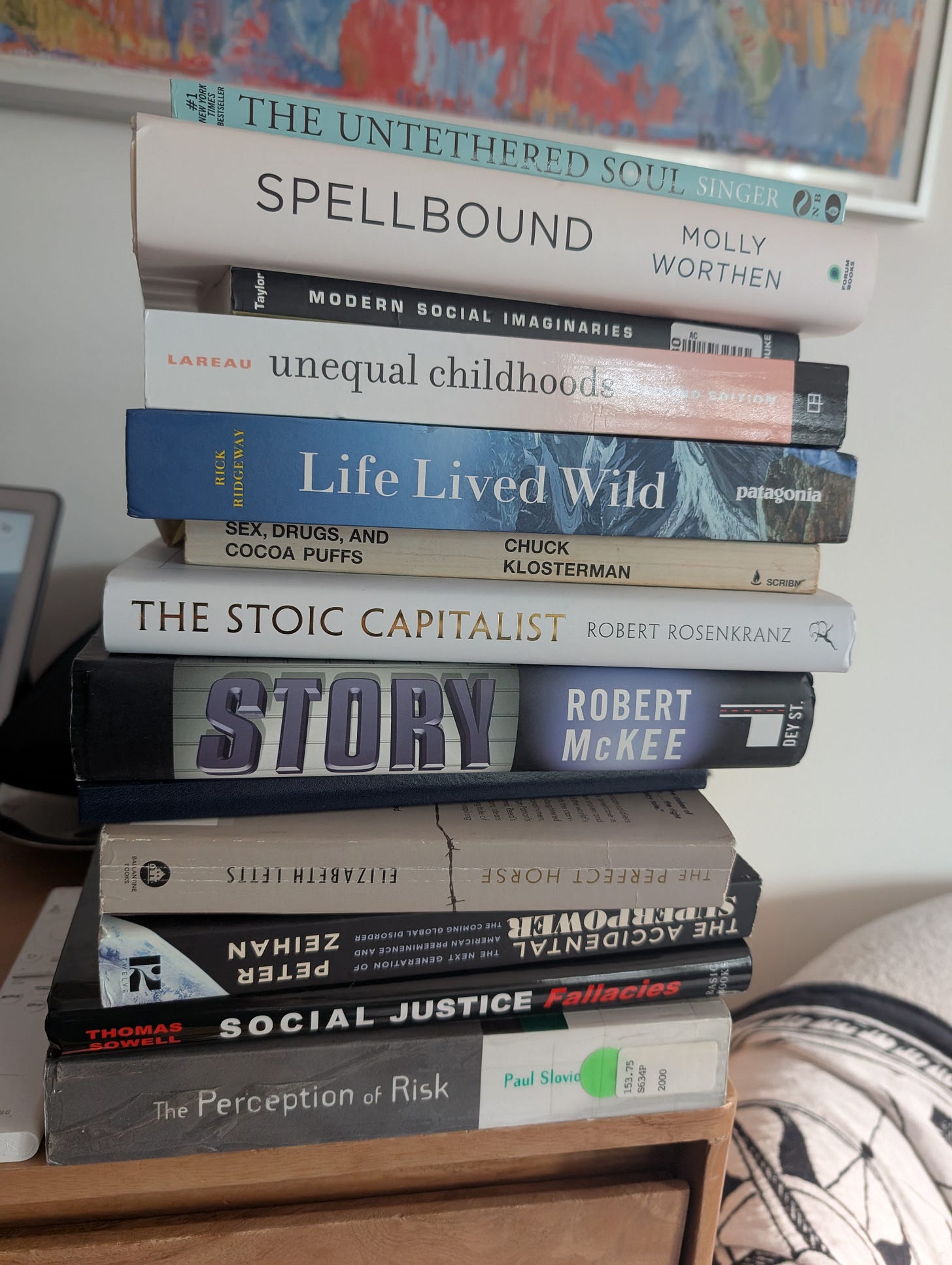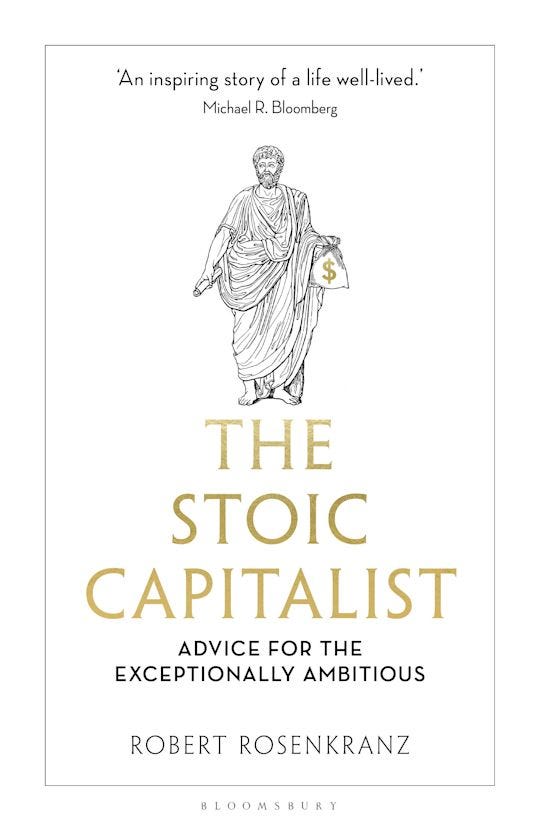Unread ≠ Unloved: In Defense of the Books You Bought But Haven’t Touched
Thanks to Ella for sparking this post, onwards to greater books - both read and unread!
In this issue:
What your unread books actually say about you — and why guilt is the wrong feeling
Tsundoku, the Schrödinger’s Book, and the untapped psychology of your anti-library
A great book to read (The Moral Animal), and one I proudly returned (Open Socrates)
May refer-a-thon: A signed copy of The Stoic Capitalist up for grabs
Why the weird email timing?
Each issue goes out at when one of my sons were born and made me whole.
This one comes at Oscar’o’clock - enjoy!
What Your Stack of Shame Says About You
Given the curious kind of reader this Substack tends to attract, I’ll go out on a limb and assume that you too have a stack of shame.
Mine is less a stack and more a structural threat to my apartment, or at least the $40 Walmart shelves I had the prescience of buying before the previous trade wars.
They all creak with books, both read and unread, but none unloved.
The reason for the epistemological overflow is that I’m a sucker for book recommendations.
If I were an Oprah fan, I’d have bankrupted myself during her book club’s golden years. These days, I’ve narrowed my sources to two: the CEOs and founders I interview, and my students, who, I must say, offer some of the most esoteric, delightful titles I would never have picked up myself.
And then there’s the recent conversation I had with a billionaire (who’s own ‘not-a-memoir-memoir’ is up for grabs, signed) cracked open a new dimension for me by introducing me to the art of biographies, which I’d once considered literary taxidermy, and that have now come to line my shelves with purpose. The only problem is that now they join all the other books I haven’t read. Which is… a sizeable portion of them.
Hence the stack of shame.
To give you an example of what one such stacks looks like, here’s what the dog dragged in over the past weeks. I’m glad to say I’ve notched out two of these (The Stoic Capitalist and Sex, Drugs and Cocoa Puffs), but the rest mock me and my unfounded and equally unbridled optimism that convinced me that I’d ever find the time to read all these.
Each book in my collection tells a story I care more about than its contents, the story of why I bought it. Sometimes it’s a flicker of curiosity I can’t explain yet. Sometimes it’s the promise of an answer to a question I haven’t learned to fully even articulate. Other times, it’s a signpost to a self I might become.
I’ll give you an example.
One of my bookshelves (back right, third row) is filled with over 30 volumes from a mostly forgotten anthropological series that reached the end of its usual shelf-life decades ago. It began with a simple question about the Yanomamö and how their famously warlike behavior has been misrepresented in mainstream writing (TLDR; humans are actually incredibly averse to deadly confrontations, even in the most ‘warlike’ cultures). One book led to another, and after hundreds of hours I should be well on my way to an unofficial B.Sc. in the analysis of nomadic and pastoralist cultures from the perspective of what that can tell us about the limits of modern social engineering of the grandest sort (a topic I’ll write about in my 60s, hang on tight!).
Do I remember every theory or finding? Of course not.
Have I become unbearable at parties with an unending stream of anecdotes no one else sees value in? Absolutely.
Hemingway, here’s the point I’m rambling towards : Unread doesn’t mean unloved.
Nassim Taleb wrote about it in The Black Swan, when he discussed Umberto Eco’s antilibrary, a collection not of what you know, but what you want to know. There’s a great term in Japanese culture for this concept too: tsundoku which is the practice of acquiring more books than you can ever read.
Each entry in the antilibrary represents intention. These special kinds of books map the intellectual terrain we’re still navigating, and signal the kind of person we’re considering becoming. In a very literal sense, they are our future selves, stacked in waiting. Sometimes, even the simple act of owning a book holds the door open to a self we haven't yet become.
And there’s one more phenomenon worth naming: the book we never read because doing so would close the loop. The anticipation becomes too important. We don’t want to know how it ends. We just want to know it could.
Maybe the Schrödinger’s Book might be a good fit, representing the potential selves that remain unresolved as long as we don’t go beyond the cover.
Your bookshelf is more than a record of past intellectual consumption. It’s a blueprint to reconstructing your unique knowledge set. A living, evolving starmap of what you're drawn to, what you hope to understand, and who you're building yourself into.
In this sense, it’s only normal that a functioning library is part archive, part altar, part ambition. It’s the only place where curiosity gets to live as both question and answer, unfinished at times, but always entirely present as a part of us.
So the next time you feel guilty about that unread title, remember this: each unread page is not a source of shame.
They are signposts of who you are becoming.
Oh, and if you’re looking to add tomes to your own stack, Robert’s Stoic Capitalist is a great one to place on top. Refer a friend to be eligible for winning a signed copy.
A book to read
Robert Wright’s The Moral Animal.
This is the book that sparked this entire post.
I’ve owned The Moral Animal for years, long enough for the paper to yellow at the edges and for the cover to warp slightly from shelf pressure and guilt. Sure, I got it secondhand, but staying on my self for two or more years haven’t helped it age.
Robert Wright’s deep dive into evolutionary psychology is a book so widely praised and cited it’s practically a rite of passage for anyone trying to understand why humans behave the way we do.
And yet, for the longest time I thought I’d never even start reading it. Not because I didn’t want to, I knew I desperately did ever since I saw the first reference to it.
Instead, I was worried what would happen to my hours between 8pm-10pm if it re-opened up my evolutionary psychology rabbit hole which took years from my life the last time I jumped in.
As I was on my way to the wonderfully curious dinner that inspired my “can opener question” post, I was looking for a quick read on the plane. For whatever reason, the Moral Animal made the cut, and before I was 30 pages deep I knew exactly the person to send it to. From that conversation came this post, thank you, Ella.
A thing to do
Return the books that disappoint you.
For years, I held onto books I didn’t finish out of shame. I told myself they reflected something incomplete about me. That I lacked the discipline, the patience, the maturity to power through. And I, for one, don’t like to consider myself a loser, at least when it comes to books.
But at some point (earlier this year, in fact), I grew up. And part of growing up is learning to stand behind your own taste.
I now proudly return the ones that don’t hold up. The last one I sent back was Open Socrates, a book that surely worked as therapy for the author, but came nowhere near justifying the expectations I had for it. Socrates deserved better. So did I.
You don’t owe any book your loyalty. If it doesn’t spark anything, insight, tension, joy, discomfort, it can go. Not every page deserves a place in your library, anti- or otherwise.
A thought to have
Embrace Tsundoku
The Japanese have a word, tsundoku, for the practice of buying books and letting them pile up unread.
It validates your stack of shame and tells us unread books are not a problem. They are a portrait of us, in the making. They’re invitations from a future you that you haven’t RSVP’d to yet, and maybe never will. That’s fine.
Tsundoku is the only kind of clutter that grows you just by being there, so embrace it.
Mine Your Kindle
Project Gutenberg
I don’t own one.
Partly because I’m committed to the feel of pages. Partly because I love what a full shelf says — to others, yes, but also to myself. See what I’ve built. See who I’ve been becoming. I like to pull books down at random. To reread a line I forgot. To marvel at what I once thought was worth underlining.
Also, I still can’t get over the idea that digital text often costs the same — or more — than the printed page. (If I’m paying that much, I want spine and texture.)
But for those of you who swear by your Kindle: I’m happy for you. Truly. I admire the portability, the sync, the instant gratification.
I just haven’t gotten there.
And maybe, like a certain book on evolutionary psychology, I might never.
Recent writings on Forbes and beyond
Latest: How To Win In The Age Of AI Agents And Automation (Forbes)
Your Brain Hates Your Cubicle—Here’s How to Thrive Anyway (Psychology Today)
Arvind Jain: The Humble Builder Behind Glean And The Future Of Agentic AI (Forbes)
The Outsider Advantage: How Naïveté Fuels Billion-Dollar Startups (Forbes)
Never Make a Bad Choice Again by Embracing Self-Nudging (Psychology Today)
The Psychology Of Better Choices: How Startups Are Rewiring Our Habits (Forbes)
Staying Curious Is the Most Dangerous Thing You Can Do (Psychology Today)
After Arkansas: The Future Of FEMA And U.S. Disaster Relief (Forbes)
Ryan Gellert on Building a Future Where Sustainability Is Not Optional (Forbes)
Why Struggling (the Right Way) Helps You Learn (Psychology Today)
Want to Make Better Decisions? Copy the Slime Mold (Psychology Today)
Your Brain Was Built to Forget—Make It Work For You (Psychology Today)
The Case For Terminal Optimism In An Unpredictable World (Forbes)
The AI Coordination Revolution You Haven’t Heard About Yet (Forbes)
Where and how to get involved
A book is coming.
The Curiosity Code (yes, the book) is officially in motion. I’ll be drafting chapters this fall, weaving together insights from CEO interviews, classroom sessions, and conversations like the one we’re having here. If you have stories about range, curiosity, or unorthodox paths — I’d love to hear them in the chat or comments.
A podcast is brewing
We’ve started taping episodes for the first season of The Curiosity Code podcast. Early guests include the CEOs of Lovesac, Grindr, NOVOS, Front, and Aampe, and if the stars align, Ryan Reynolds and Stephen Dubner will make appearances. Can’t wait to launch this properly in a few months.
Come say hi in person:
Private charity salon in NYC
AIAI LLM Ops event
NYC Chief AI Summit
Generative AI Summit
My Harvard & Columbia leadership courses
I am currently conducting a study on range and how it impacts people’s career trajectories. Ten questions and a name will get you on the hall of fame as we pump up the n on the study. Link below - thanks for considering it!
You’ve reached the end - thanks for scrolling all the way down.
Curiosity is best when enjoyed in great company.
Refer this issue and grab a chance to get a signed copy of Robert’s book that I got after a conversation that taught me how to properly read memoirs.












